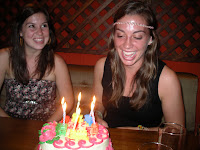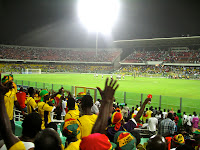Internship
This semester I am interning at an organization called Women Action Group (W.A.G). W.A.G is an NGO founded by Felicia, a Ghanaian woman who at the age of 18 was forced to drop out of school for personal reasons. In an effort to support herself, Felicia learned the skills of hairdressing, seamstressing and catering. Once she became successful, she taught other women in her community these skills as well as a way to help them out of their difficult circumstance. Almost twenty years later, Felicia received a massive donation that allowed her to open a small school where she could continue training young women.
W.A.G is now a vocational school that offers skills training in seamstressing, hair design, and catering. The school also offers classes in English, social studies, and human rights. After graduation, a microfinance organization provides graduates the money and supplies necessary to open their own business and they are given two years to pay back their loans. Initially I was interested in and applied to W.A.G because of their attention to human rights and women’s empowerment. When I was accepted I expected to be working with the human rights teacher and helping wherever necessary. However, due to lack of funding, W.A.G cannot afford to hire a human rights teacher so they asked me to become theirs.
For the past two months I have been creating lesson plans on various issues ranging from general human rights to human trafficking to child labor/fair trade etc in an effort to help the women at W.A.G understand their rights and more importantly, how to protect them. I have no teaching experience so creating my own lessons has been a tad overwhelming. I was extremely nervous before my first lesson but before I knew it Felicia told me the women were ready for me so I just walked in and began. Halfway through I realized that I’d been teaching for thirty minutes without even really thinking about it and by the end of the lesson I realized how much I loved what I was doing.
When I was in high school my favorite teacher Mrs. Devine introduced me to human rights. She taught me that change doesn’t come from one giant donation or policy reform. It is the small steps towards progress that are most important. This is the same lesson that I’m trying to teach the women at W.A.G. Most of them are victims of the very issues I’m teaching them, and none of them are in the financial situation to support their cause with money. So, I’m trying to teach them what Mrs. Devine taught me, education is power. Everyone is capable of participating in change because everyone has a voice that can bring awareness to the injustice that surrounds them.
While I’ve been trying to familiarize the women with the Ghanaian law and legal system, I realize just as much as they do how corrupt that system is. These women need to look outside their own government and rely on NGOs around them. More importantly, they need to rely on themselves. In my last few lessons I’ve asked the women to teach one other person in their community what they learned in class and then write about it, I’ve asked them to write letters to various organizations, but most importantly I’ve asked them to respect and listen to one another. These women have dealt with more struggles in their lives then I’ll ever be able to understand but they are so smart and so strong and if they all came together for a collective cause, they really could make a difference.
My goal is to expose them to human rights issues around the world. I hope that by making them aware of people who have even less than they do, they will feel empowered to make change instead of feeling like they are the only victims. Hopefully helping others will allow them realize that they can also help themselves.
As much as I love Ghana, I have never thought so much about what it means to be a woman. While there are plenty of educated and progressive men and woman in this country, a huge population of Ghana is severely tethered to a patriarchal and chauvinistic past. Ghanaian women today battle to surmount this past but their struggle is a tiresome one. Most of the women I teach are my age and many of them have children. While being mothers makes it difficult for them to leave their abusive husbands or acquire enough money for a college degree, I am thankful that these women are at least in school and on the road to financial independence. Hopefully they will teach their own children about human rights issues and maybe that generation will be the one that creates real change for Ghana.
I know this entry is mostly big picture things and not very specific about what day-to-day life is like at W.A.G but I will be blogging about my experience there more. For now, my time there has been a mix of frustrating and thrilling. Sometimes the women are super difficult but other times they are engaging and responsive – I am learning so much simply by being around them and if I can have even a little bit of the effect on them that Mrs. Devine had on me, then I’ll be happy. All for now!

































